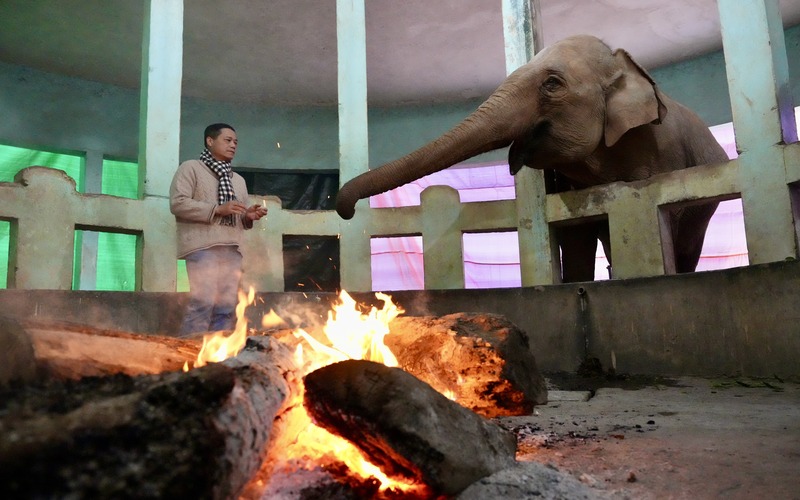Hanoi Zoo turns up the heat to keep animals warm in bitter cold
When the outside temperature drops to 15 degrees Celsius, Hanoi Zoo's anti-cold measures are activated.
Thu Le Zoo, the largest public zoo in Hanoi, has taken several measures to keep its animals warm amid a cold snap that has seen temperatures drop to lows of 11 degrees Celsius.
The measures include installing heaters, lighting fires and providing warm water to protect the animals from the chilly weather.
Built in 1976, the zoo covers nearly 29 hectares in Ba Dinh District, five kilometers west of downtown Hanoi. It is home to nearly 700 animals from 90 different species, many of which belong to rare groups threatened with extinction.
Over the past week, zookeepers have been working around the clock to ensure the animals have the heat they need to survive the capital's first cold winter.
Bonfires at the zoo are always maintained in enclosures where tropical animals, such as elephants, are kept. Photos: Duy Khanh/The Hanoi Times |
Nguyen Danh Cuong, deputy director of Animal Husbandry and Development Enterprise No. 1 under Hanoi Zoo, told The Hanoi Times that when the outdoor temperature drops to 15 degrees Celsius, Hanoi Zoo's anti-cold work is activated.
"In the hippopotamus area, the hot water is poured into the tanks to create a warm water environment for the hippopotamus. We have to work in 24-hour shifts to adjust the thermostat of the heater and monitor the health of the animals," Cuong said.
He added that the animals' diet is supplemented with sugar cane, nutritional bran and vitamins. "Special food with high nutrient and vitamin content is added on particularly cold days to improve their strength and immune system," Cuong said.
"A water heating system is used to provide hot water for the hippos," Cuong said. |
According to Than Thuy Hanh, who cares for the elephants, the animals tend to get bored and irritable when kept indoors, so she often has to visit and comfort them. On cold days, zoo staff light fires and put straws on the floor to help the animals sleep.
"Larger animals like elephants, which usually live in larger, more open areas, have had their cages covered to protect them from the cold winds that blow through the zoo grounds," Hanh told The Hanoi Times.
Than Thuy Hanh, an employee of the Hanoi Zoo, adds supplements to the food for the hippos. |
Le Sy Dung, general director of the Hanoi Zoo, said they already have plans in place to protect the animals during the winter.
"We have installed heaters in the areas for large animals such as elephants, tigers, lions or bears to get warm on freezing days. In the areas for deer and horses, firewood is lit day and night, and dry grass and straw are placed on the floor of their cages," Dung told The Hanoi Times.
He stressed that the zoo is always careful to provide the animals with more nutritious food to improve their ability to withstand the cold weather. "They are also given frequent health checks and are separated for monitoring if they fall ill. Fortunately, they're all in stable health now," Dung added.
The weather in northern Vietnam, including Hanoi, has been dropping to 9-11 degrees Celsius for over a week. The cold front is expected to pass through from January 31.
Large canvases shield the elephant enclosure from biting winds at Thu Le Zoo in Hanoi. |
High-powered heaters have also been installed near the zoo's elephant, lion, bear and tiger enclosures to keep temperatures at a reasonable level. |
An employee checks a space heater in front of a lion cage. |
Thu Le Zoo has two warehouses with straw and dry grass in preparation for winter. |
A zookeeper adjusts the temperature on a heater in the tiger enclosure at Thu Le Zoo. |
A herd of deer gathers near a fire in their enclosure at Thu Le Zoo. |



.jpg)
.jpg)
.jpg)
.jpg)
.jpg)
.jpg)
.jpg)
.jpg)








